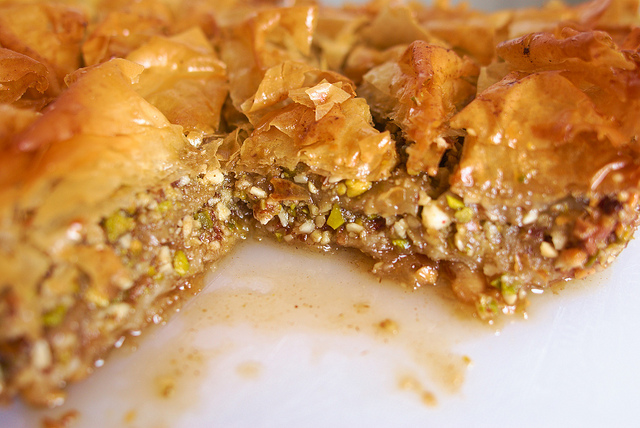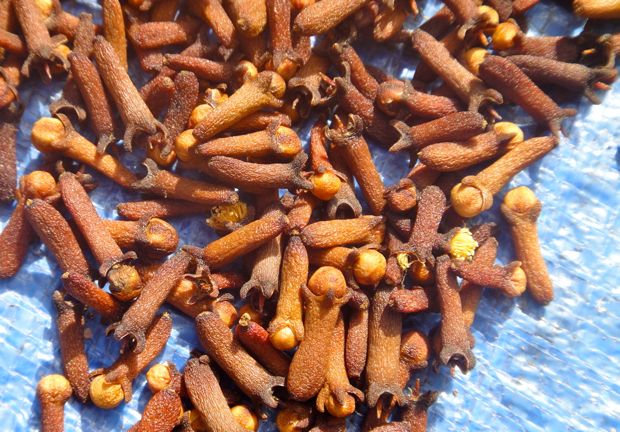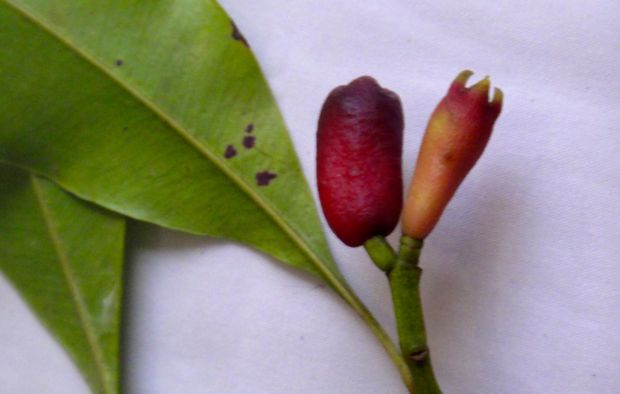Consider Cloves

It’s hard to imagine that an everyday ingredient in the spice rack could once have been worth almost its weight in gold. Yet cloves, just like peppercorns, were more valuable than silver back in their day.
And these little dried flower buds, native to the Spice Islands of Indonesia (today’s Moluccas, or Maluku), sparked great empires, epic wars and, indeed the age of exploration.
Which is something to think about when you turn your attention to mulled wine…
If you’ve ever visited the Spice Islands during harvest time, the air is rich with the scent of both cloves and nutmeg.
They dry in the streets, on tarpaulins weighted down with rocks, pretty much as they have done for centuries, ready for grading and sale in the spice markets of Kota Ambon, down south.
When picked from the towering deciduous trees that bear them — one tree in Ternate is supposed to be 500 years old or more — they look like nothing so much as miniature rose hips.
How did they get their value in the old days?
Well, traditional medicinal systems around the world have long valued the medical benefits of cloves — both Chinese and Ayurvedic systems use them, the Greek “father of medicine” Hippocrates used them in tinctures, as did the Roman, Arab and European doctors who followed in his wake.
Cloves journeyed on the mysterious spice route from the great beyond — the islands were, some thought, populated by monsters and demons — to the Malay peninsula, and then overland to China, India, Europe and North Africa.
What were they used for?
Clove oil is, of course, an effective anaesthetic: it was used as a toothache remedy in Western Europe until extremely recently, while the specialists who castrated eunuchs for the harems of the Chinese emperors washed their genitals in clove solution before performing the operation.
In Ayurvedic systems, cloves are considered to help with digestive problems of all kinds, as well as improving the circulation and metabolism. And in traditional Chinese medicine, cloves are considered both pungent and warming, and can help to purify the stomach, spleen and kidneys.
Western medical systems until very recently shared many of these beliefs. Many “bitters” recipes, such as the famous Angostura Bitters, developed to deal with stomach ailments incurred by Europeans in the tropics, include cloves for precisely this reason.
And, of course, the pungent scent of cloves, that tangy, eucalyptus-pepper-citrus spice, was used by doctors during the bubonic plague: to protect themselves both from the bad air believed to carry the disease and the smell of putrefaction, they wore beak-like masks full of spices, among them, cloves.
Even today, clove tobacco is the signature scent of rural Indonesia, and works as an alternative to cash in many areas.
Yet the primary use of cloves during medieval times, and Roman times, was as a spice for cooking. Medieval banquet recipes feature quite astonishing quantities of cloves, as indeed they did saffron — perhaps more as a symbol of status than an actual guide to practicalities.
What to use them for today?
Well, there’s nothing so delicious as the scent of cloves studding an orange, unless it’s the scent of mulled wine, and you’ll find cloves used in everything from curries to rice pudding.
But, if you’re feeling self-indulgent, there’s no better addition to baklava, that decadent blend of honey, nuts, filo pastry, butter and spices, than a hint of cloves (powdered, of course) that you’ll find all over the Middle East and Eastern Mediterranean.
This excellent, easy recipe from Antony Worrall-Thompson is a good place to start.

And, if you’re passing through the Spice Islands, don’t forget to pick up a bunch of clove leaves. Dried, they are used like bay leaves, as an addition to soups, curries and stews.
With a flavour every bit as tangy as bay leaf but with that extra nuance of cloves, they are, I’d say, the perfect addition to any broth at all.


